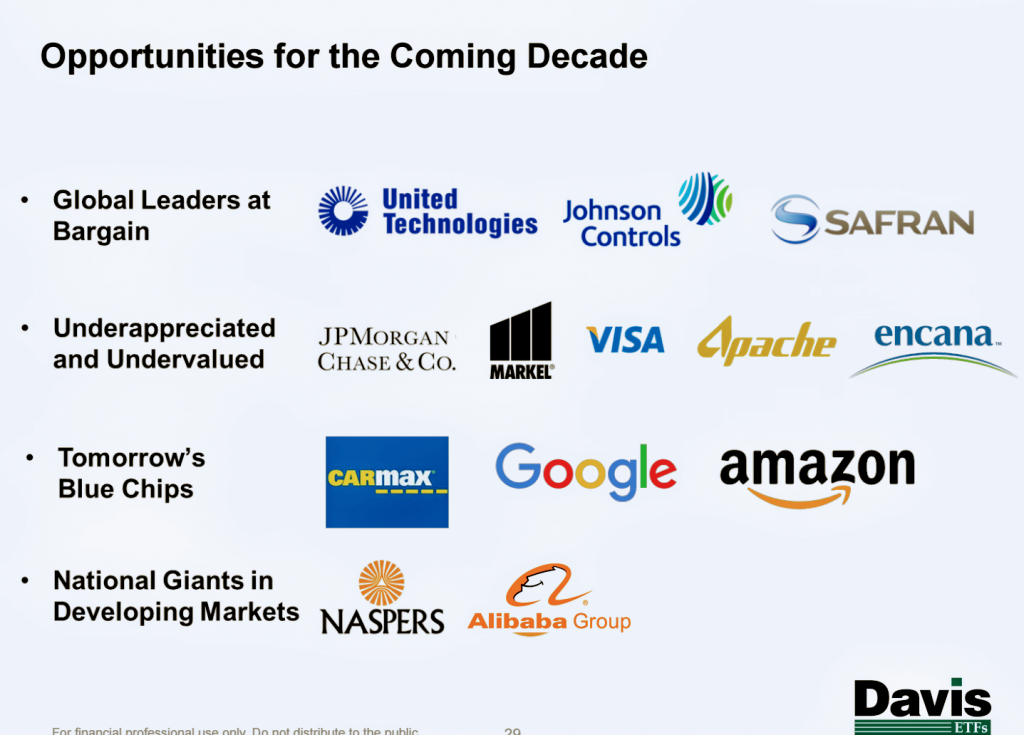Chris Davis, portfolio manager of Davis Advisors says he is buying “what people hate.” For the most part, it’s paid off.
U.S. banks are a particular favorite. He sees a “triple play” in financials due to rising earnings, multiples, and profits coming back to shareholders through dividends. He singled out Wells Fargo (WFC 57,13 -0,72 -1,24%), Capital One (COF 147,89 +0,64 +0,43%), and J.P. Morgan (JPM 192,14 +2,73 +1,44%) as examples of companies his team believes have gotten out front in terms of fintech.
“This is where active managers have an advantage,” he said in a webcast that ran on May 24. The one hour seminar is available on demand here – WATCH IT NOW.
Davis co-managers the Davis Large Cap Value fund with Danton Goei. His team has been together for over 15 years, overseeing five core strategies. The strategies are single investment philosophies, benchmark agnostic high conviction trades, and all have outperformed their indexes since they launched. “Active management is not dead,” he assured participants. “We have a strongly different view on that.” He said many retail investors are still afraid of investing in companies that have made headlines either because of the Great Recession or some sort of economic crisis, like energy stocks last year. But buying the unloved security here and there always pays off. A $10,000 investment in their flagship fund, started in 1969, is now worth over $2 million, beating the S&P 500. A small advantage over the benchmark, compounded over time, can have life-changing impacts on a portfolio, he said in a nod to active money management.
Davis singled out four categories where he is finding opportunities today. Besides financials, he says he is looking for multinational corporations trading at a discount due to trade related headwinds. Another play is in big companies that have a disruptive model. Call them the future “blue chips”. That’d be companies like Amazon (AMZN 178,87 +0,72 +0,40%). The future blue chip can sometimes trump the value factor. Another category is investing in national giants in emerging markets, like China’s Alibaba Group (Alibaba Group Holding Limited 68,82 -0,79 -1,13%).
Over the years, Davis has offered their core strategies as mutual funds, separately managed accounts and institutional accounts. This winter, they took three strategies and turned them into ETFs.
“It came from client demand. They liked our mutual fund strategies, but wanted them in an ETF format,” said Dodd Kittsley, director of ETF strategy at Davis Advisors during a separate interview with the RIA Channel. “These are traditional ETFs, but they use time tested active management.”
Their Davis Select Financial (DFNL 32,90 +0,31 +0,96%) is similar to their financial themed mutual fund that’s been around since 1991. The expense ratio on that fund is just 0.92%, well below the Lipper category average of 1.63%. The ETF is cheaper of course with an expense ratio of 0.65%. The two other newcomers are the Davis Select Worldwide (DWLD 32,70 +0,58 +1,80%) and the Davis Select U.S. Equity (DUSA 39,62 +0,40 +1,02%) fund.
“Many advisors that have traditionally only done ETFs and had no history with our firm have been increasingly reaching out to us thinking that maybe they should reserve a place in their passive ETF portfolios for active ETFs,” said Davis. Investors don’t need to commit to all active or all passive approaches, he said. Many sophisticated investors combine investments in exceptional active management strategies with investments in passive strategies to their advantage.
Davis’ new financial ETF, DFNL isn’t 100% financials. It has a small weighting to technology stocks like Google (Google Inc. 148,74 -0,94 -0,63%) and some real estate. Its biggest holdings are Markel (MKL 1.479,65 +8,24 +0,56%), American Express (AXP 238,96 +5,96 +2,56%) and Berkshire Hathaway (BRK.A 615.175,00 -2.108,99 -0,34%). Only one of the three has beaten the S&P 500 so far this year and that’s Virginia-based insurer Markel, up 9.25% year-to-date.


